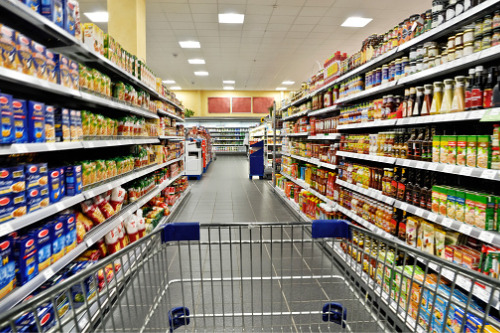

It’s time for the dreaded weekly grocery shop. You change into something more presentable for the public (you’ve donned the same sports leisure wear all week while working from home), and you might even reach for a pair of gloves and a protective face mask. You walk to the nearest grocery store to find a line-up so long that it’s snaking around the block. Shoppers are stood on tape markings six feet apart from each other, and a security guard armed with hand sanitizer is letting groups in 10 at a time. Welcome to grocery shopping amid a global coronavirus pandemic.
Grocery stores, especially the large commercial chains, have experienced a huge increase in volume in connection with the coronavirus. While that’s a positive outcome for the sector, it also lends itself to an increase in risk. When you have more people coming in and out of the store, more people rushing to minimize potential contamination time, and more employees on site trying to stock shelves, help customers and maintain the facility, there’s a much greater exposure for things like slips, trips and falls – a core driver of claims among grocery clients.
As grocery stores ask employees to work overtime to help with increased demand, their workers’ compensation exposure also increases. Kevin Sandelin, director of risk management services at Argo Group, commented: “When you have employees working more hours, obviously it might be good for them from a compensation standpoint – and there are some grocery stores going above and beyond to compensate their employees for overtime – but we also know very clearly that from a workers’ compensation standpoint, the risk goes up. That’s something employers need to consider at this time.”
Aside from slips, trips and falls, and the workers’ compensation exposures, grocery stores also have to consider the coronavirus itself. There are lots of things they can and should do to reduce potential exposure to the virus to employees and customers – first and foremost, keeping sanitation levels high and maintaining (if not heightening) existing risk mitigation best practices.
“Grocery stores must maintain their existing standards,” Sandelin told Insurance Business. “Hopefully, they’ve already got some sort of premises inspection program in place, where they’re sweeping the facility on a regular basis to ensure there are no slip, trip and fall hazards. Don’t fall off of that. In fact, now is the time to increase that. Maybe they need to train a couple more folks on how to check the premises and so on. Now is the time to do that because it’s the right thing to do for their customers, their employees and their businesses. Customers and employees expect to be able to shop or work in a safe environment, so it’s important to be diligent about premises inspections.
“On top of that, there are additional things grocery clients can do to protect customers and employees, like encouraging the use of hand sanitizer and introducing cashier shields. These are plexiglass screens that they can connect to the back of the cash registers to provide a barrier between cashiers and customers. Grocery stores right now are some of the busiest places in the country, so it’s good for those employees to have that extra physical separation to reduce the chance of somebody coughing or sneezing or breathing on them. Another thing stores are doing right now is putting tape markings on the floor six feet apart at registers and at service counters. These measures are not necessarily traditional hazard reduction, and they may not reduce exposure from an insurance standpoint, but they give everybody peace of mind and help everybody stay safe while they’re in the facility.”
One final thing for grocery stores to focus on is communication. During times like these, when everyone is preoccupied with the coronavirus pandemic, it’s hard for loss control professionals to bang the drum and ask busy employees to be extra vigilant. Sandelin commented: “They really need to re-emphasize: ‘We’re here for you. We support you. We’re going to give you all the tools you need to work safely. But you’ve got to maintain best practices. If you’re stocking shelves, practise safe lifting. If you’re on the meat counter, practice safe cutting. If you’re prepping food, practice safe sanitation.’ It’s really important to reinforce those pieces at a time like this.”
